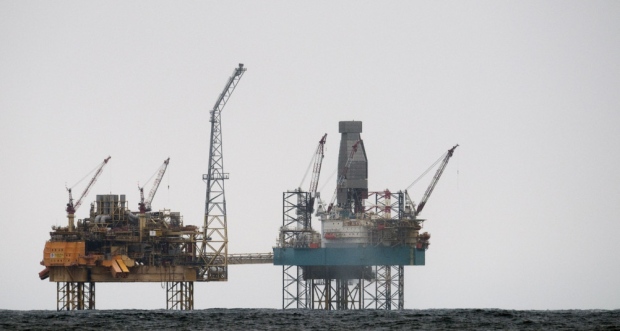OIL revenues from the North Sea plummeted by a factor of almost six in just a year, according to Scottish Government figures revealing that the money made from Scotland’s off-shore industry has fallen to its lowest ever level.
Economists warned that thousands more jobs could be lost from the North Sea sector following publication of a report showing that only £168 million was generated in tax receipts from the industry in the first three months of this year, compared with £969 million over the same period last year.
The extent of the crisis facing North Sea oil and gas came to light in a Scottish Government document recording Scotland’s dwindling geographic share of oil revenue, a decline caused by the dramatic fall in the oil price. The figures were contained in the Scottish Government’s Quarterly National Accounts, which revealed that as recently as 2012 the figures for the first three months of the year were as high as £3 billion.
Revenue for the first quarter of 2013 fell to £1.37 billion.
Scotland’s leading oil economist, Professor Alex Kemp, of Aberdeen University, said the figure could be explained by the fall in the oil price, which has dropped from $115 per barrel in June last year to $46 per barrel.
“The oil tax revenues have collapsed with the oil price collapse,” Kemp said. “The industry is in a very difficult situation now. At the moment the industry is adjusting to the fall in prices very painfully by reducing its costs and deferring projects.
“Nobody knows exactly how many jobs have been lost, but it is certainly several thousand. Our modelling says this will continue this year and into next year. However, our modelling is also showing that when the industry has reduced its costs and it has time to reassess all the many projects that have been put on hold, by 2017 – even without an increase in the oil price – there should be some more investment in new fields and projects which will alleviate the situation a bit. But we can say that this year and next year will certainly be very tough.”
Scottish Conservative finance spokesman Murdo Fraser argued that the figures showed the benefits of Scotland staying within the UK.
He said: “The plunge in oil revenues for the first three months of this year is incredible. Whichever way you look at it, and with the best will in the world, there is just no way an independent Scotland could survive on this.
“We knew the price of oil was volatile, and that this would be a risk. But to see such a radical drop is alarming. Thankfully, within the strength of the UK, this shock can be absorbed.
“It’s time the SNP acknowledged this benefit, instead of constantly trying to drag Scotland to a place where it would be utterly reliant on these dwindling receipts.
“The SNP must also now admit that its next best thing – full fiscal autonomy – is simply not viable. That would have almost all of the same financial pitfalls as independence, leaving Scotland completely exposed.”
Last night the Deputy First Minister John Swinney said: “Our oil and gas bulletin confirmed that Scotland remains the biggest oil producer in the EU. Recent figures from DECC [Department of Energy and Climate Change] suggest that May saw the most oil and gas produced in the North Sea since March 2012. If this trend is sustained, production could increase this year for the first time in 15 years.
“Oil, however, is a bonus, not the basis of Scotland’s economy. Even without it, Scotland’s output per head ranks third of the 12 countries and regions of the UK behind only London and the South-east.”
North Sea oil revenues drop to an all-time low



























Laissez un commentaire Votre adresse courriel ne sera pas publiée.
Veuillez vous connecter afin de laisser un commentaire.
Aucun commentaire trouvé